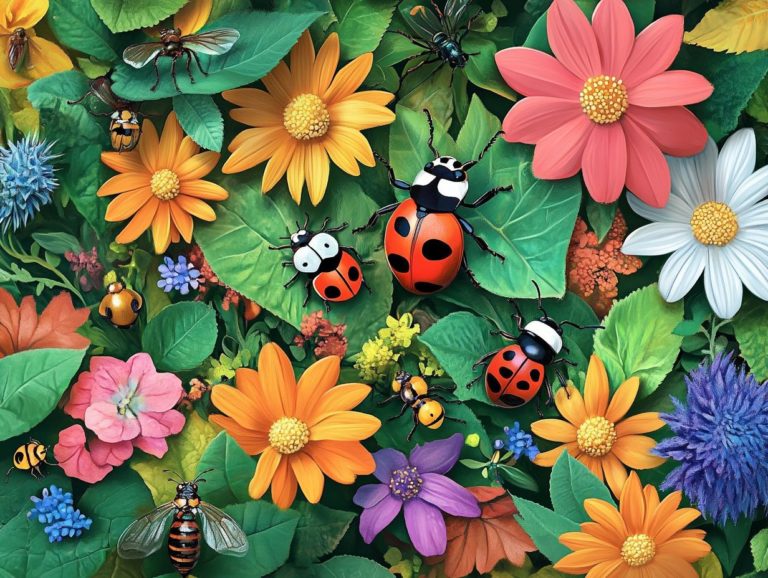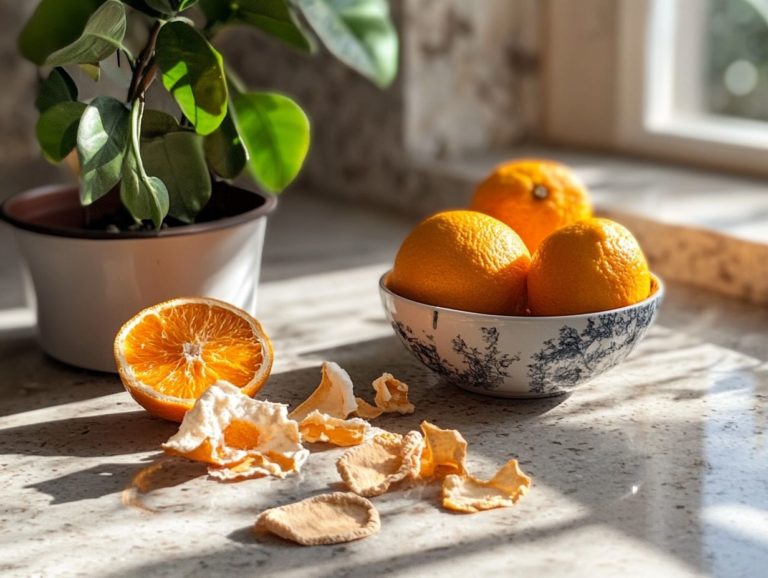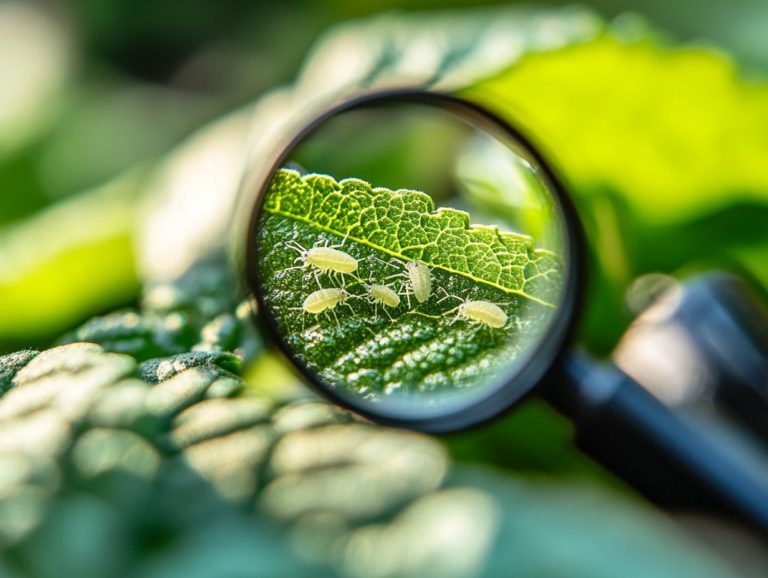5 Ways to Use Vinegar as a Pest Repellent
Don’t let pests take over your home! If you re weary of pesky pests invading your home and garden, vinegar might just be the natural remedy you’ve been looking for.
This useful item you probably already have at home not only enhances the flavor of your meals but also serves as a surprisingly effective repellent for a range of unwanted guests.
Discover five simple methods to harness the power of vinegar to keep ants, mosquitoes, flies, and even fleas at bay, while also uncovering what makes it such an effective pest deterrent.
You ll also find answers to common questions about its application and other pest control uses. Bid farewell to harsh chemicals and embrace a safer, eco-friendly approach!
Contents
- Key Takeaways:
- 1. Keep Ants Away with Vinegar and Water Solution
- 2. Deter Mosquitoes with a Vinegar Spray
- 3. Protect Your Garden from Pests with Vinegar
- 4. Use Vinegar to Keep Flies Away
- 5. Keep Your Pets Flea-Free with Vinegar
- What Makes Vinegar an Effective Pest Repellent?
- What Other Types of Pests Can Be Repelled with Vinegar?
- Are There Any Precautions to Take When Using Vinegar as a Pest Repellent?
- How Often Should Vinegar Be Applied to Repel Pests?
- Can Vinegar Be Used Indoors as a Pest Repellent?
- What Are Some Other Uses for Vinegar in Pest Control?
- Frequently Asked Questions
- Can vinegar effectively repel pests in my home?
- How can I use vinegar as a pest repellent?
- What type of vinegar should I use for pest repellent?
- How often should I apply vinegar as a pest repellent?
- Are there any pests that vinegar may not be effective against?
- Can I use vinegar as a pest repellent in my garden?
Key Takeaways:
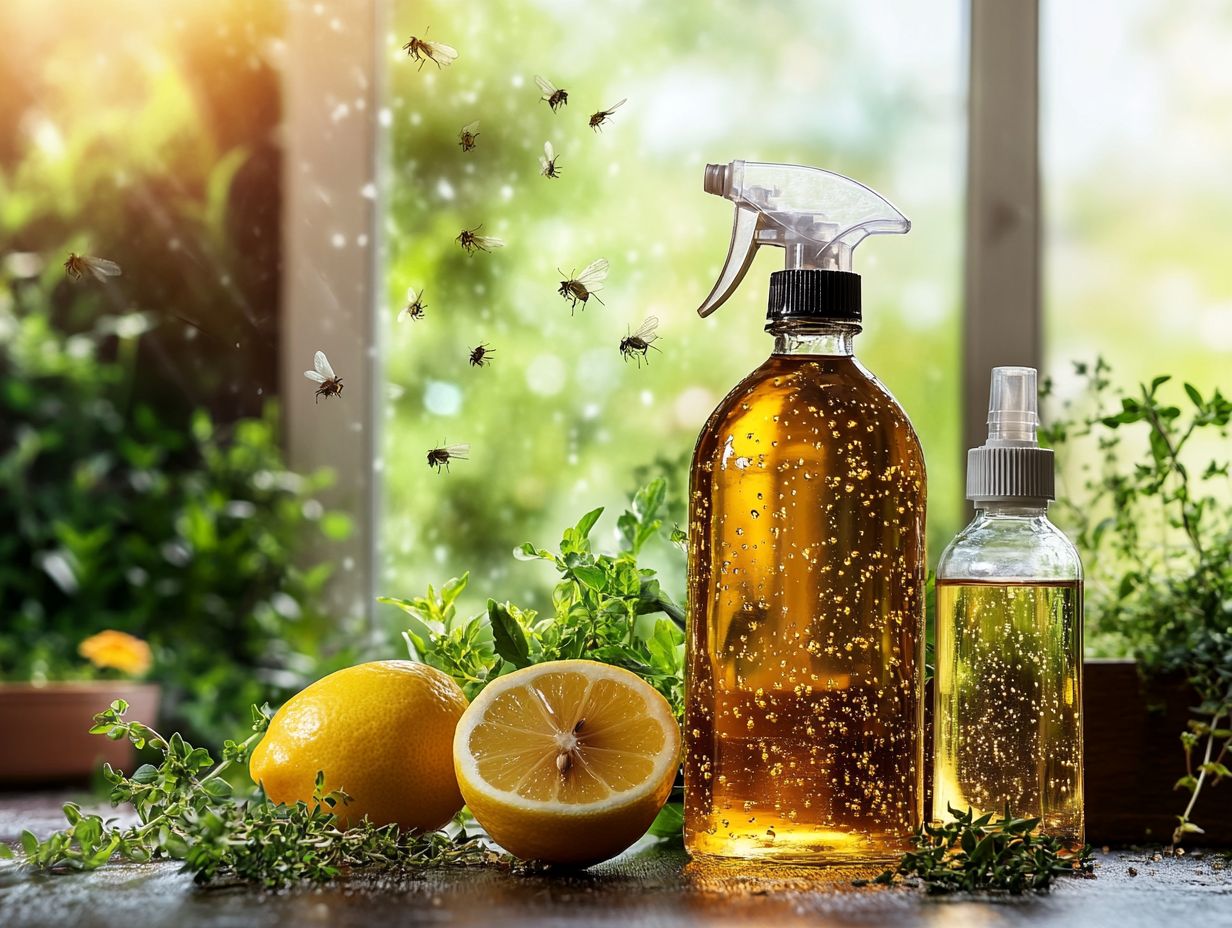
- Use a vinegar and water solution to keep ants away from your home.
- Spray vinegar to deter mosquitoes from buzzing around your outdoor activities.
- Keep your garden pest-free by using vinegar as a natural repellent.
1. Keep Ants Away with Vinegar and Water Solution
Keeping ants at bay in your home and garden might seem like a daunting challenge, but you can turn to a vinegar and water solution that offers an effective, safe, and easy-to-make alternative. This straightforward yet powerful mixture, typically crafted from either white vinegar or apple cider vinegar, harnesses the strong qualities of acetic acid to repel ants and other pests, making it the perfect homemade solution for those who prefer a natural approach.
To whip up this concoction, a simple one-to-one ratio of vinegar to water will do the trick, ensuring it s potent enough to deter without overwhelming your plants.
Experts like Samantha Johnson recommend spraying this mixture around entry points such as doorways and windows, as well as along the ant trails in your garden. Meanwhile, Michelle Bruhn suggests using a cloth soaked in the solution to wipe down surfaces, boosting its effectiveness.
Christine Froehlich points out that this method doesn t just repel ants; it also serves as a deterrent for other pests, making it a versatile and eco-friendly option.
By choosing this natural repellent, you can create a safe environment for your family and pets while effectively reducing unwanted visitors.
2. Deter Mosquitoes with a Vinegar Spray
You can also keep mosquitoes away with a vinegar spray that harnesses the power of acetic acid, transforming your outdoor spaces into enjoyable, pest-free zones. By utilizing vinegar, you not only keep these pesky insects at bay but also incorporate a versatile solution into your landscape design, ensuring that your garden remains vibrant and inviting.
To create this effective spray, choose either white vinegar or apple cider vinegar both of which contain beneficial components that deter pests. Simply mix equal parts vinegar and water in a spray bottle for an effortless formula.
For enhanced performance, consider adding a few drops of essential oils like peppermint or eucalyptus, known for their mosquito-repelling properties.
It s essential to apply this mixture regularly, especially during peak mosquito seasons, to maintain its effectiveness and keep your outdoor gatherings free from these bothersome invaders. Don t let mosquitoes ruin your outdoor fun!
3. Protect Your Garden from Pests with Vinegar
Vinegar can be your secret weapon in shielding your vegetable garden from a host of pests, offering a natural alternative to those harsh chemical herbicides that can harm beneficial insects and soil health. Thanks to its potent acetic acid content, vinegar effectively deters a range of pests, including aphids, roaches, spiders, and fruit flies, allowing you to cultivate a healthy and vibrant ecosystem.
One popular approach is to whip up a simple spray by mixing equal parts vinegar and water, which you can then apply directly to affected areas. Alternatively, soaking cotton balls in vinegar and placing them around your garden can also keep those unwelcome visitors at bay.
By integrating vinegar into your broader pest control strategy, you not only help maintain ecological balance but also reduce your reliance on synthetic chemicals, creating a safer environment for your plants and the tiny creatures that play a vital role in your thriving ecosystem.
Try these methods today and enjoy a pest-free home and garden the natural way!
4. Use Vinegar to Keep Flies Away
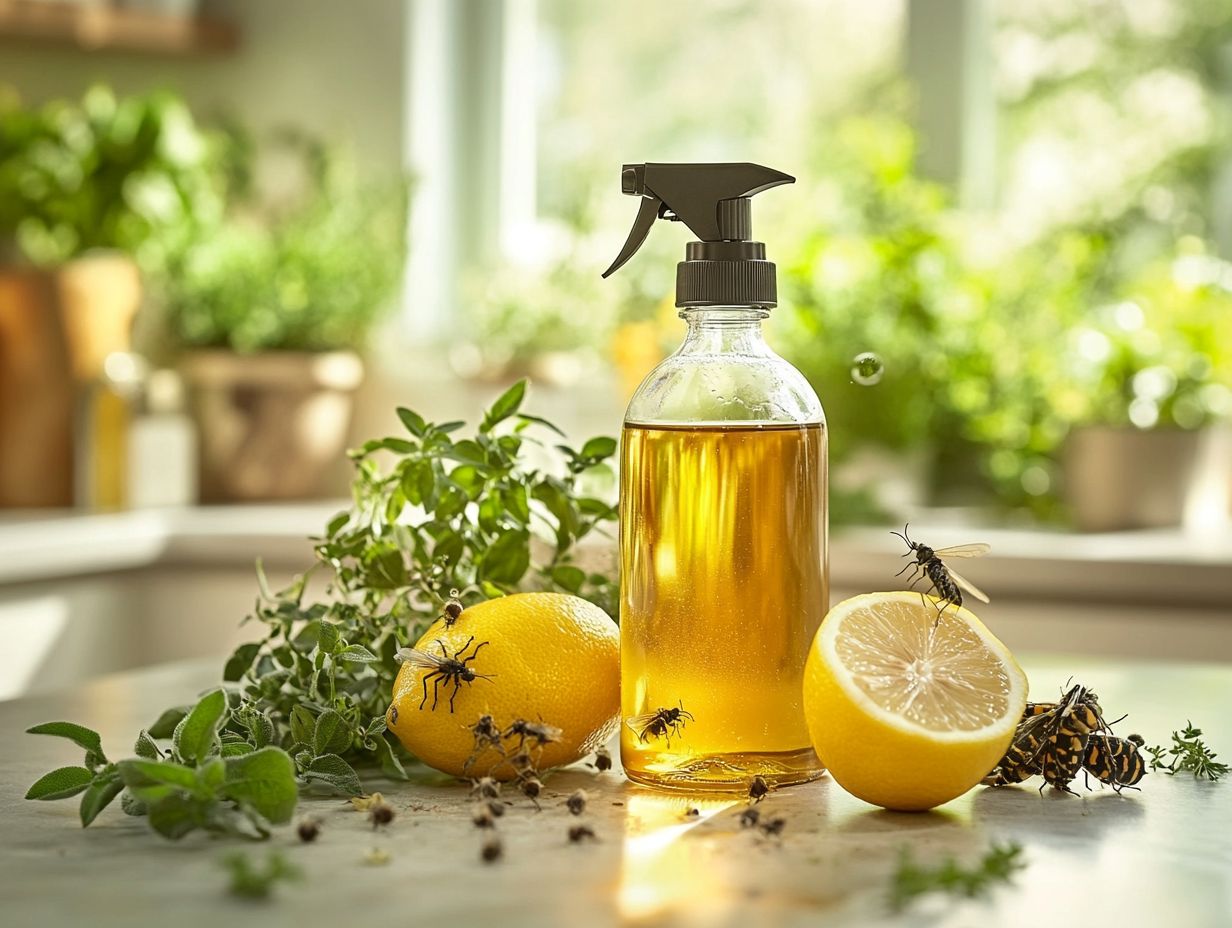
Vinegar serves as a remarkably effective and accessible solution for keeping pesky flies especially the annoying fruit flies at bay in your home and garden. It offers a safe, chemical-free approach to fly control that you can easily implement. By using the strong smell of vinegar, particularly apple cider vinegar, you can craft a homemade trap that attracts and catches these unwelcome pests. This will result in a cleaner and more enjoyable environment.
To create an efficient trap, simply mix equal parts vinegar and water in a bowl, and add a few drops of dish soap. This addition helps break the surface tension, ensuring that flies won t escape and will instead meet their demise. Strategically placing these traps in areas where flies are known to congregate like near fruit baskets or trash cans will yield the best results.
Remember, prevention is your best ally! Keeping food covered, promptly cleaning up spills, and maintaining a tidy space can drastically diminish the chances of a fly invasion. You can also use vinegar in a spray bottle to deter flies from lingering in trouble spots, making your home a less appealing venue for these unwelcome guests.
5. Keep Your Pets Flea-Free with Vinegar
Maintaining your pets’ flea-free status can indeed be a challenge, but vinegar offers a natural and safe deterrent for both your furry companions and your home. By utilizing a diluted vinegar solution, you can effectively repel fleas and other pests, ensuring the comfort and health of your beloved animals without resorting to harsh chemicals.
This simple yet effective remedy can easily fit into your broader pet care routine! To create the solution, just mix equal parts of water and white vinegar. Not only does this combination repel fleas, but it also rejuvenates your pet’s coat. Use a spray bottle to lightly mist your pet’s fur, steering clear of the eyes and mouth, and gently massage the solution into the coat. Remember to perform a patch test first to check for any sensitivities.
Incorporating vinegar into your routine cleaning can further disrupt flea populations in your home, allowing your four-legged friends to enjoy a truly pest-free life.
What Makes Vinegar an Effective Pest Repellent?
Vinegar proves to be an effective pest repellent thanks to its high acetic acid content, a substance found in vinegar, which disrupts the sensory receptors of various pests. This makes it a natural, chemical-free alternative for maintaining pest control around your home and garden. The versatility of vinegar opens up a world of possibilities; from cleaning solutions to homemade killers, it offers a holistic approach to pest management while safeguarding your living spaces.
The ability to repel pesky insects like ants, fruit flies, and spiders comes from the strong odor and taste of vinegar, which these unwelcome guests simply cannot stand. Gardening enthusiasts often argue that using vinegar as a preventative measure not only curtails infestations but also fosters a healthier ecosystem by reducing harmful chemicals in the environment. Some even recommend diluting vinegar with water to create an effective foliar spray that wards off larger pests like aphids and caterpillars while simultaneously enriching the soil.
Experts say vinegar is a key part of any organic gardening strategy, showcasing its multifaceted role in ecological pest control.
Try these vinegar methods today and enjoy a pest-free home!
What Other Types of Pests Can Be Repelled with Vinegar?
Along with dealing with ants and mosquitoes, vinegar is a powerhouse for repelling a variety of pests, including spiders, bed bugs, and aphids. This remarkable liquid becomes a critical tool for any home gardener or household. With vinegar in your arsenal, you can maintain a pest-free environment without toxic chemicals or harmful insecticides.
Vinegar creates an unwelcoming atmosphere for pests, making their habitats feel uncomfortable. For example, a simple mixture of vinegar and water, sprayed into corners or entry points, can effectively deter spiders.
To target bed bugs, apply vinegar directly to their hiding spots for impressive results. For aphids, a diluted solution applied to affected plants works wonders.
To enhance its pest-repelling power, consider adding essential oils like peppermint or lemongrass. These not only boost the barrier against intruders but also infuse your home with a delightful aroma. Regular applications will keep this pest control strategy effective, leading to a more tranquil living space.
Are There Any Precautions to Take When Using Vinegar as a Pest Repellent?
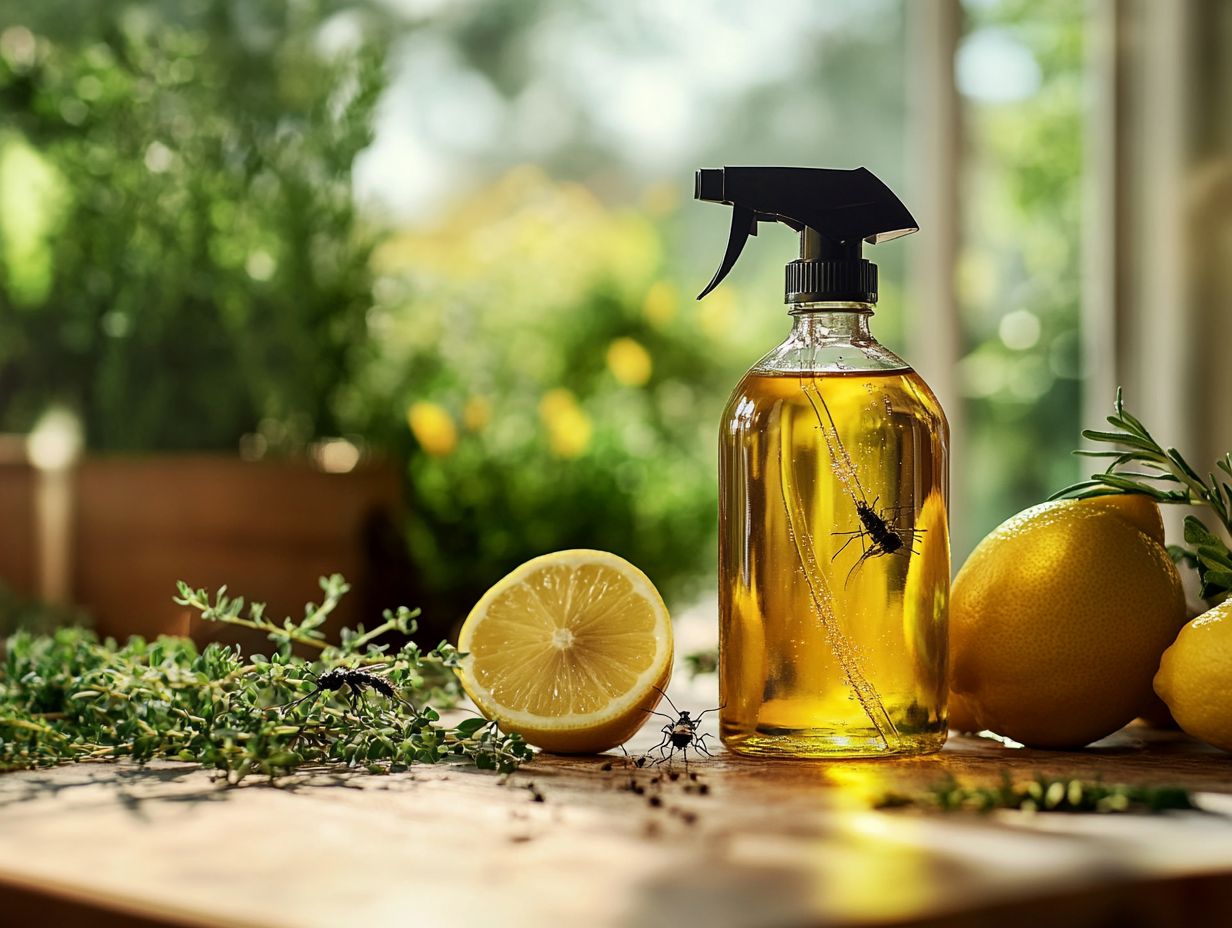
While vinegar is typically a safe and effective pest repellent, it’s crucial for you, as a pet owner or gardener, to take certain precautions for safe application indoors and outdoors.
Using a diluted solution is key to preventing harm to your plants and adverse reactions in animals. Mix one part vinegar with three parts water. This blend minimizes harshness while still deterring pests effectively.
Be mindful that some plants, especially delicate varieties like ferns and succulents, can be sensitive to vinegar. Conduct a patch test on a small, inconspicuous area before applying it widely.
Experts recommend starting with a low concentration and gradually adjusting based on plant responses. For pet owners, keep pets away from treated areas until they are completely dry. This way, you can manage pests effectively with peace of mind.
How Often Should Vinegar Be Applied to Repel Pests?
The frequency of vinegar applications as a pest repellent depends on the pests you’re targeting and environmental conditions. Generally, reapply vinegar solutions every few days, especially after rain or heavy watering, to ensure it continues to keep pests at bay.
If you re facing persistent infestations during hot, dry spells, increase your application frequency, as vinegar evaporates quickly.
For ant issues, daily applications may be necessary to fend off these relentless invaders. Similarly, if aphids or whiteflies are causing trouble, weekly applications can enhance control efforts significantly.
By understanding the specific needs of your plants, you can tailor your vinegar usage to ensure beneficial insects remain unharmed while effectively managing unwanted pests.
Try vinegar today and enjoy a pest-free living space!
Can Vinegar Be Used Indoors as a Pest Repellent?
Yes, you can absolutely use vinegar indoors as a highly effective pest repellent, especially against those pesky household nuisances like fruit flies and roaches. This not only elevates your home cleaning routine but also keeps your space inviting and safe.
By utilizing vinegar in different forms, such as sprays or traps, you can address indoor pest issues without resorting to harsh chemicals, creating a healthier living environment.
To harness vinegar’s power against these unwelcome guests, try making simple homemade traps. For example, mixing equal parts of vinegar and dish soap in a bowl can attract and trap fruit flies with surprising effectiveness.
Regularly wiping down surfaces with a vinegar and water solution not only sanitizes but also releases a scent that repels pests. Regarding roaches, applying a vinegar spray in their hiding spots can effectively deter their return.
Incorporating vinegar into your cleaning routine helps in pest control and keeps your home smelling fresh. It also avoids toxic residues. It’s a win-win for both cleanliness and comfort.
What Are Some Other Uses for Vinegar in Pest Control?
Beyond repelling pests, vinegar can serve multiple roles in pest control. It acts as a cleaning agent to eliminate attractants and functions as a natural herbicide to control unwanted plants. Its versatility makes vinegar an important tool in both gardening and home maintenance, offering a range of eco-friendly solutions for those seeking effective pest management.
By incorporating vinegar into your routine, you can create a less inviting environment for insects. For instance, wiping down surfaces with a vinegar solution effectively removes food residues and odors that draw pests in.
When dealing with pesky weeds, a vinegar-based spray can efficiently eliminate unwanted vegetation without the harsh chemicals typically found in conventional herbicides.
To elevate your pest management strategies, consider combining vinegar applications with physical barriers and natural ways to control pests. This holistic approach not only enhances effectiveness but also fosters a healthy ecosystem, reducing your reliance on synthetic pest control products.
Frequently Asked Questions
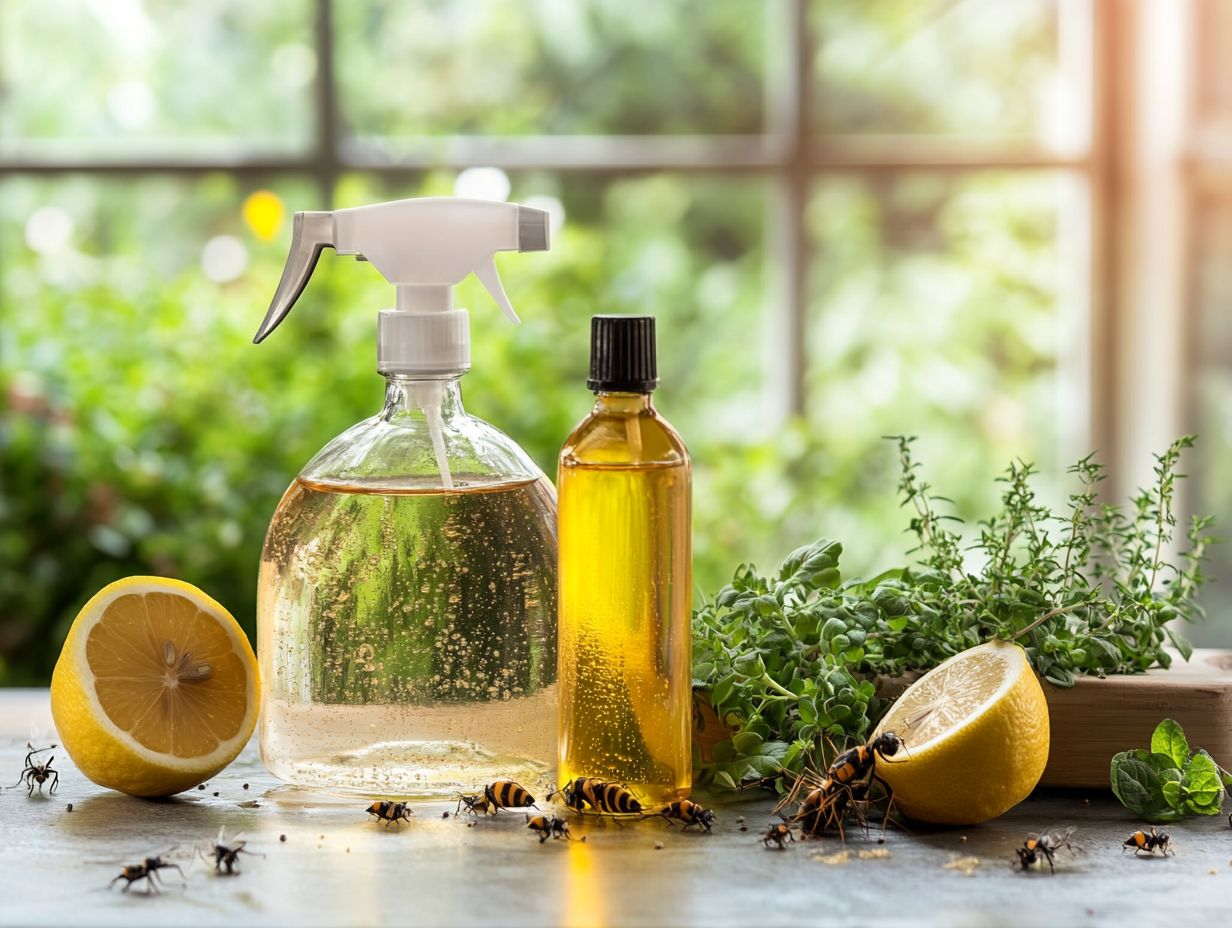
Can vinegar effectively repel pests in my home?
Yes, vinegar is a natural and safe alternative to chemical pest repellents and has been proven to effectively repel pests such as ants, cockroaches, and fruit flies.
How can I use vinegar as a pest repellent?
There are several ways to use vinegar as a pest repellent, including creating a vinegar spray, placing vinegar-soaked cotton balls in areas where pests are present, and using vinegar as a cleaning solution for surfaces where pests may be attracted. For more effective strategies, consider the top 5 natural pest deterrents for your garden.
What type of vinegar should I use for pest repellent?
White vinegar is the most commonly used type of vinegar for pest repellent, as it is affordable and has a strong odor that pests dislike. However, apple cider vinegar can also be effective due to its high acidity.
How often should I apply vinegar as a pest repellent?
The frequency of application will depend on the severity of the pest infestation and the type of vinegar being used. Generally, it is recommended to reapply the vinegar solution once a day until the pests are no longer present.
Are there any pests that vinegar may not be effective against?
Vinegar may not be as effective against larger pests such as rodents and spiders, as they are less likely to be repelled by the strong odor. It is best to use vinegar as a preventative measure for smaller pests.
Can I use vinegar as a pest repellent in my garden?
Yes, vinegar can be used in your garden to repel pests such as slugs and snails. Simply create a vinegar spray and apply it to the affected areas of your garden.

